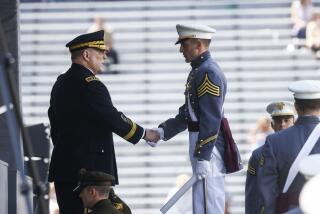Mullen says lay out limits of force
- Share via
WASHINGTON — The country’s top uniformed officer said Monday that the Defense Department should be ready to tell civilian leaders when military force is not the best response -- and be prepared to transfer resources to other agencies during times of crisis.
Adm. Michael G. Mullen, the chairman of the Joint Chiefs of Staff, previously has made the case for nonmilitary solutions to world problems, but his comments Monday were his most forceful to date on the subject.
They also came as he prepares to report to a new president who has pledged to strengthen America’s “soft,” or nonmilitary, power abroad.
Reacting to trouble spots is a natural reflex for the military, and the Pentagon’s willingness to respond ensures that it gets more resources. But its ever-present readiness means the military is frequently asked by top civilian leaders to do more.
“I believe we should be more willing to break this cycle,” Mullen said, “and say when armed forces may not always be the best choice to take the lead.”
Mullen did not say whether he thought military power had been used improperly.
But he said that in many situations, the military should mainly support efforts by other agencies.
“We must be just as bold in providing options when they don’t involve our participation or leadership,” Mullen said.
Mullen’s comments carry particular weight because the Joint Chiefs may play a larger role in military planning in the Barack Obama administration than they did under President Bush, who relied heavily on field commanders and civilian leaders for advice.
During his campaign, President-elect Obama spoke of plans to consult with the Joint Chiefs -- the uniformed leaders of the Army, Navy, Marines and Air Force -- and their chairman.
Obama also has appointed a national security advisor, retired Marine Gen. James L. Jones Jr., who has advocated a more prominent role for the chairman.
Mullen’s views are in line with the thinking of Defense Secretary Robert M. Gates, who has spoken out many times about the need for the military to work more closely with civilian agencies.
In a series of speeches, Gates called on Congress to provide more funding for the State Department’s foreign service and the U.S. Agency for International Development.
To offset the shift in U.S. approaches, the Pentagon has transferred funding to help the State Department send civilian officials to trouble spots. Pentagon officials also have encouraged military assistance for stabilization efforts.
But Mullen said efforts to shift resources to other agencies were insufficient. He argued that Congress should provide greater flexibility for the military to transfer funding during a crisis.
“As an equal partner in government, I want to be able to transfer resources to my other partners when they need them,” Mullen said.
Mullen’s remarks came in an address to the Nixon Center, a Washington-based think tank founded by President Nixon, which presented Mullen with its annual leadership award.
Mullen said that changes in federal policy would encourage greater civilian risk-taking. Among needed improvements are safeguards such as life insurance and medical care for people serving in volatile regions, he said.
Mullen said the military has much to learn about how the State Department and other agencies use such power effectively.
“If we are truly to cut oxygen from the fire of violent extremism,” Mullen said, “we must leverage every single aspect of national power -- soft and hard.”
--
More to Read
Sign up for Essential California
The most important California stories and recommendations in your inbox every morning.
You may occasionally receive promotional content from the Los Angeles Times.










